25 NEW FACES OF INDEPENDENT FILM 2005
16 STEW
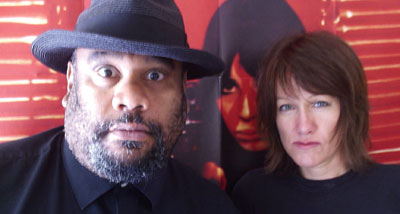 |
USUALLY IT TAKES A FAIR AMOUNT OF FILMMAKING AMBITION AND YEARS OF PREPARATION TO GET ACCEPTED INTO THE SUNDANCE SCREENWRITING AND DIRECTING LABS. For the “multimedia art-duo” known as STEW — which consists of 43-year-old Stew and 46-year-old Heidi Rodewald — the path to the indie-film fast track began when they got a regular gig last year at Joe’s Pub, the music club run by New York’s Public Theater. “The booker started bringing in people from the Public to check out my shows,” recalls Stew. “Our songs are pretty character-driven and somewhat narrative, so I guess they saw a musical. Everything just progressed from there.”
In quick succession, Stew and Heidi — who’ve released albums with the bands The Negro Problem and STEW — were commissioned by the Public to create a musical-theater piece, Passing Strange, which was accepted at the Sundance theater lab. At the lab they were approached by Sundance feature-film program co-founder Michelle Satter, who encouraged them to develop a screenplay. Without any prior screenwriting experience they produced the first draft of We Can See Today, a story of two families — one African-American, one Jewish — who share a house in late-’70s Los Angeles. The project received such a favorable response that Stew decided to try to direct the film, and he returned for Sundance’s directing labs in June. “After years of leading bands, I’ve really believed pretty firmly in only doing what you know about doing,” says Stew. “But for the last year the question really hovering over my career has been ‘Why not?’” — M.R.
Contact: stewoffice@yahoo.com
17 MARK BANNING & MAD MATTHEWZ
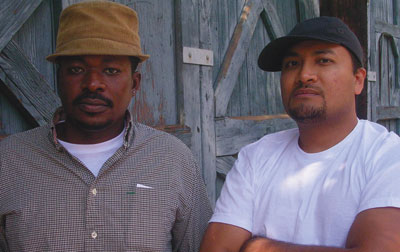 |
MAD MATTHEWZ CAN REMEMBER EXACTLY HOW HIS LOVE FOR FILMMAKING BEGAN.“As a teenager, I watched a film called She’s Gotta Have It that would change my life,” reminisces Matthewz. “It was like nothing I had ever seen before and I knew instantly that I would go on to make movies.” A few years afterward, Matthewz met up with Mark Banning at Brooklyn College, forming a partnership (along with future cinematographer Cliff Charles) that’s currently restyling Lee’s Brooklyn milieu — and his filmmaking ideals — for a new generation. The Matthewz-directed, Banning-produced Men Without Jobs, an “urban, hip-hop, slacker comedy,” hit a nerve at last year’s Tribeca Film Festival, with three sold-out screenings and hundreds of people turned away; last month the Banning-directed, Matthewz-produced Jellysmoke, an introspective drama about a young man overcoming psychosis, nabbed the Los Angeles Film Festival’s Best Narrative Film Award (and its $50,000 cash prize, North America’s largest). While miles apart in plot and tone, both films are connected by their vision of contemporary Brooklyn and of the young, nuanced African Americans that live, work, steadfastly avoid work, love or fail to love there. Embodying Nelson George’s prediction at the time of She’s Gotta Have It that “there are other Spike Lees out there, and I expect to see them bringing the Brooklyn of their lives to theater screens in the coming years,” Matthewz and Banning are doing just that, and audiences, starved for a reflection of themselves, are responding. “Our performance [last year] at Tribeca let me know that there is an audience for this kind of film,” noted Matthewz. “As is often the case, we’re just waiting for the industry to respond.” — J.S.
Contact: Banning: info@jellysmoke.com; Matthewz: mad@mad24fps.com
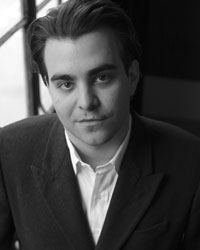 |
AFTER GETTING A BFA IN FILM FROM NEW YORK UNIVERSITY IN LESS THAN THREE YEARS, Nicholas Jarecki was chomping at the bit to direct. To find out how, he went straight to the source and created a book from it, Breaking In: How 20 Film Directors Got Their Start. For Jarecki “it was a great experience, because I got to meet all these people that I idolized and worshiped by asking them, ‘How did you go from being a schmuck like me to being a big shot?’” While there was no single answer, Jarecki found the key was different parts talent, perseverance and luck.
All three of these qualities came into play in the making of his debut feature The Outsider, a documentary portrait of director James Toback. As luck would have it, his friend, actress Michelle Williams, told him that she’d just auditioned for — and been freaked out by — Toback, who was casting for a new movie. Jarecki, who had interviewed Toback three years earlier for his book, immediately rang him up to see if he could document his process. Armed with a Sony PD-150, a lot of ideas and tons of perseverance, Jarecki set off and emerged two years later with a documentary that screened to acclaim at both the Tribeca Film Festival and CineVegas.
As a youth, Jarecki remembers, “nobody in my family was in the movie business.” Now the name “Jarecki” seems synonymous with documentary filmmaking. But while his older brothers — Eugene (The Trials of Henry Kissinger) and Andrew (Capturing the Friedmans) — have already made names for themselves, Nicholas is not interested in being part of a dynasty. His next project is a film version of Bret Easton Ellis’s Los Angeles satire The Informers, which he has co-written with Ellis and which is being produced by Ed Pressman. — P.B.
Contact: Jeff Berg at ICM: (310) 550-4000
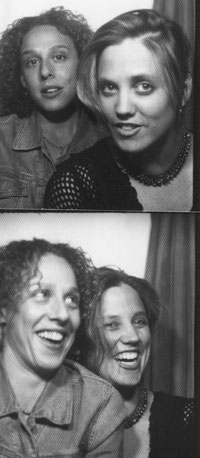 |
“WE ARE BOTH LOUD, LIKE TO HAVE A GOOD TIME AND ARE INSATIABLY CURIOUS,” explains Heidi Ewing of her directing partnership with Rachel Grady. “And we are both interested in important topics that can inspire change,” adds Grady.
The doc-directing team met in 1996 when they both worked for Jonathan Stack’s Gabriel Films, co-producing and directing a film for A&E on the Church of Scientology. At the time, Ewing lived in L.A., fresh off a stint producing E!’s True Hollywood Stories. Grady lived in New York and had been doing commercial jobs as well as working at her mom’s detective agency. They worked on the project together for four months on the two coasts before meeting. “We immediately got along,” says Ewing.
After spending a few years producing TV docs for other companies, the two decided to form their own outfit, Loki Films. They hatched two ideas: a TV doc on the criminally insane and a feature, The Boys of Baraka, about poor Baltimore inner-city youth who travel to Africa and live in a village on an innovative youth-empowerment program. After completing the first, they went to work on the second. “It took us a year to get access, two years to shoot and a year to edit,” says Ewing.
The duo’s work paid off. The Boys of Baraka is a moving and insightful documentary about class, poverty, ancestry and education in America. It won the Special Jury Award at SXSW, will premiere at New York’s Film Forum in the fall and will air on PBS’s POV next summer. “Psychologically, we’ve overcome a big hurdle,” says Ewing. “We now know we can make beautiful, important films.”
The duo are already working on their next project, a doc about “evangelical children.” “We brainstorm [ideas] together,” says Grady. “But once we establish our language, we take turns going into the field, so we always have one set of fresh eyes when looking at our footage. It works to the advantage of the film to have two people who care about it getting made.” — S.M.
Contact: rachel@lokifilms.com, heidi@lokifilms.com
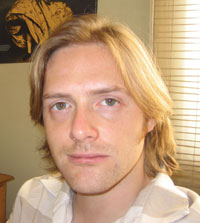 |
PSYCHOTIC RESTAURANT EMPLOYEES BATTLE IT OUT WITH RELENTLESS LITERARY AGENTS OVER THE SERVICES OF A VERY CONFUSED SCREENWRITER-DISHWASHER in Oliver Cheetham’s riotous short film A Higher Agency. While shot in London on a substantial budget (it includes a full-on shootout) and with a cast of top-notch British stage actors (among them Sir Antony Sher), A Higher Agency is in fact Cheetham’s NYU thesis film. “A number of years ago I read the short story when I was working at a literary agency, and I just loved the absurdity and darkness of it,” says Cheetham. “Luckily I was able to raise a good deal of money, so I was able to make it in London in the right kind of way.” A Higher Agency premiered at NYU’s First Run Film Festival in April, where it took home prizes for Best Film, Best Director and Best Screenwriter.
Cheetham, 31, was born and raised in London and worked briefly as an actor on TV and theater productions before he decided to make the switch to directing. “I would say the absurdist sensibility is really what I find the most interesting,” says Cheetham, who counts playwright Harold Pinter, Monty Python, Luis Buñuel and the Coen brothers as his greatest influences. He’s currently living in London, where he’s in talks to direct several features for producers in both Europe and the U.S. — M.R.
Contact: olcheet@gmail.com
<< Back | Next >> [1-5 | 6-10 | 11-15 | 16-20 | 21-25]
VOD CALENDAR


 See the VOD Calendar →
See the VOD Calendar →


